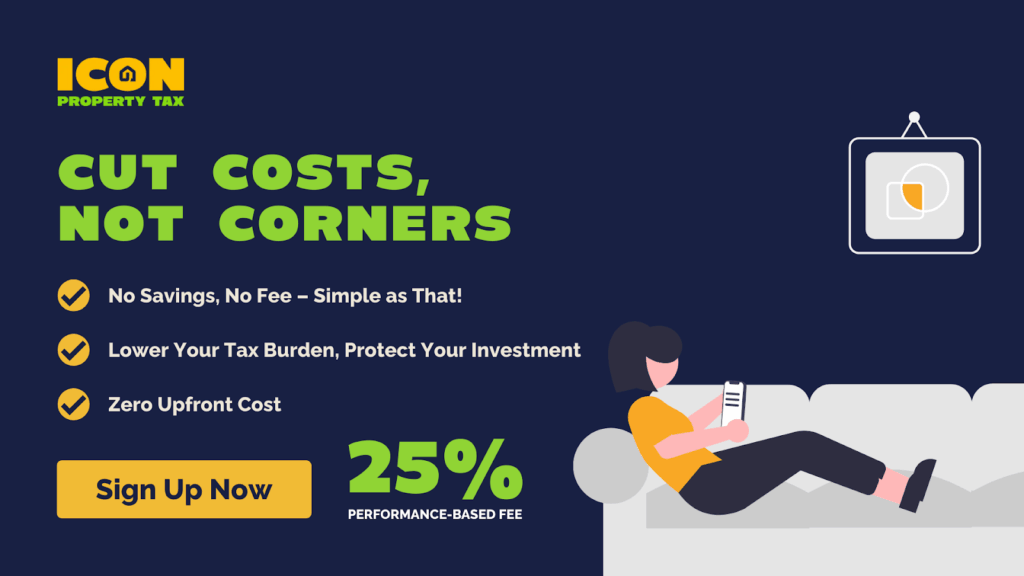Hamilton County TN Property Tax: Rates, Due Dates, And Exemptions
September 11, 2025
Key Takeaways:
- Key Elements Of The Hamilton County, TN Property Tax Process: Understand the property tax process in Hamilton County, Tennessee, including how rates are determined, key payment due dates, and the exemptions available to reduce your taxable value.
- Steps To Appeal An Assessment: Learn the steps necessary to appeal an assessment, from reviewing your assessment notice to submitting evidence and preparing for the hearing with the Board of Equalization.
- How Icon Supports Property Owners: Discover how Icon Property Tax can assist with fair valuation appeals and offer strategies for ensuring your tax bill accurately reflects your property’s actual market value.
Icon’s record of success is built on results that matter. With over $100 million in property tax reductions secured, a 90% success rate, and more than 30 years of combined expertise, our team has consistently delivered real savings for property owners. In the last year alone, 82% of our clients achieved lower assessments. With no upfront costs, every appeal is driven by one goal—fighting for fair property taxes.
Managing Hamilton County, TN, property tax requires more than simply writing a check when the bill arrives. Assessment cycles, rate changes, and county deadlines all shape the final amount you owe, while exemptions can create meaningful opportunities for savings. Missing even one requirement can lead to higher bills and added stress. Property owners can make smarter choices and avoid costly mistakes by understanding the basics of rates, due dates, and available exemptions.
In this blog, we will explore how Hamilton County, TN property tax rates are set, the key due dates you need to remember, the exemptions that may apply, and the options available if you need to appeal your assessment.
2025 Assessment Cycle And Key Dates
Every year, Hamilton County recalculates property values in sync with market trends and local development, shaping the property tax bill in your mailbox. For property owners, understanding the schedule for the 2025 assessment cycle is vital to make sense of your notice and take action if your valuation feels off the mark.
January – April 2025
The Hamilton County Assessor’s Office begins collecting updated property data and reviewing values adjusted for new sales, renovations, demolitions, and shifting market conditions. Around this time, most properties are given a preliminary value based on current market information.
May 2025
Expect your official Notice of Appraised Value to arrive. This document will outline the county’s determination of your property’s tax value for the year. Carefully review every detail—it sets the stage for the rest of your property tax obligations.
May 2025 – Mid-June 2025
If you spot a valuation that doesn’t align with recent sales, market realities, or your property’s physical condition, the window to appeal or protest is now open. File your protest in writing with the Hamilton County Board of Equalization before the published deadline, usually falling in mid-June. Missing this cutoff means waiting another year for a potential adjustment.
June – July 2025
Hearings are scheduled for property owners who’ve filed timely protests. During these sessions, you can present evidence like recent appraisals, repair invoices, or comparable sales to support your case for a lower valuation. The Board of Equalization reviews disputes and makes final decisions on assessed values for the remainder of the tax year.
Late Fall 2025
Tax bills reflecting final assessed values are sent out, and payments become due. To avoid penalties, keep the county payment deadlines in mind.

Payment Options Accepted By The Trustee
Hamilton County property owners have several ways to pay their property taxes, each designed to fit different preferences and needs. The Hamilton County Trustee’s Office accepts payments in person, by mail, online, or through select banks during the tax collection period.
- In-Person Payments: Payments can be made directly at the Hamilton County Trustee’s Office. For those who prefer face-to-face service or need a receipt on the spot, bringing a tax notice along to the Trustee’s public office ensures a smooth process.
- By Mail: Property owners can mail a check or money order. It’s essential to include the payment stub from the tax bill and allow enough time for postal delivery, as the postmark date is used to determine if the payment is on time.
- Online Payments: For those who value convenience, the Trustee’s website offers an online portal for credit card, debit card, or electronic check payments. Please note that processing fees may apply for card transactions. This option is available 24/7, making it possible to settle your bill from the comfort of home.
- Bank Payment Locations: Select banks partner with the Trustee’s Office during the collection season, providing another local option for taxpayers who want to handle payments at their neighborhood branch. Policies and hours may vary by participating bank, so it’s advised to call ahead and confirm details.
- Partial Payments & Escrow Accounts: The Trustee also accommodates partial payments throughout the tax collection season, which can be helpful for those budgeting their annual tax expense. If you have an escrow account with your mortgage lender, the lender generally pays property taxes on your behalf, but it’s smart to confirm the arrangement each year.
Review due dates and processing times before choosing your preferred payment method to avoid late fees or penalties. Each option offers its advantages, allowing you to select the approach that fits your situation.
Steps To Appeal An Assessment In Hamilton County
If your property tax assessment in Hamilton County feels higher than expected, you can challenge it through a formal appeal process.
Here’s a straightforward look at each step:
1. Review Your Assessment Notice
Start by carefully examining the assessment notice sent by the Hamilton County Assessor of Property. Take note of the appraised value, property classification, and any changes from previous years. Compare these figures with recent sales of similar properties in your neighborhood.
2. Gather Supporting Evidence
Collect documentation that substantiates your claim. This can include recent sale prices of comparable properties, independent appraisals, photographs showing property condition, or repair estimates. Solid evidence forms the backbone of a strong appeal.
3. Informal Discussion With The Assessor’s Office
An informal review with an assessor can often resolve discrepancies without a formal hearing. Prepare your evidence and request an informal meeting; these are typically available soon after assessments are mailed.
4. File A Formal Appeal
If unsatisfied with the informal discussion results, file a formal appeal with the Hamilton County Board of Equalization. You must submit a written appeal application; deadlines are strict, so act quickly. The window for appeal is usually short, often 30 days from the date assessment notices are mailed.
5. Attend The Board Of Equalization Hearing
At your scheduled hearing, present your case to the Board. Bring all supporting documentation and be prepared for questions from board members. This setting allows you to clearly show why your property’s assessed value should be adjusted.
6. Further Appeals
If the local board does not rule in your favor, you may escalate the matter to the State Board of Equalization and, if necessary, the Chancery Court. Each level requires timely filings and thorough preparation.
Appealing your assessment requires attention to detail and a proactive approach, but it can significantly impact your property tax liability if your case merits a reduction.

How Icon Property Tax Fights For Fair Valuations
Most property owners know that an unfairly high tax assessment can translate into significant financial strain, year after year. The appeal process, however, often feels daunting, with technical valuation reports, legal jargon, and deadlines that don’t wait. That’s why so many individuals and businesses seek experienced support when it’s time to push back.
Local Knowledge And Analytical Expertise
A professional firm specializing in property tax appeals brings deep local knowledge and an analytical approach. The process starts with carefully reviewing your property’s current assessment, followed by a comparison to real-time sales data and market trends. Every detail, from square footage discrepancies to overlooked depreciation, gets a closer look.
Building A Compelling Case
Once potential issues are identified, skilled negotiators assemble clear, compelling cases tailored to each property. These agents file formal protests directly with the county appraisal district, advocating for you in hearings, presenting evidence, and countering arguments from the appraisal side. Throughout the process, transparency is key: clients can track the status of their appeal, access documents, and receive straightforward updates at every step.
A Risk-Free Approach To Savings
Our risk-free structure sets us apart: clients pay only when successful reductions are achieved. Instead of upfront fees, the focus stays on fighting for actual tax savings and keeping your best interests at the forefront.
Tips For Budgeting Before The October 1 Due Date
Preparing for the October 1 property tax deadline in Hamilton County, TN, involves setting a plan that protects your cash flow and minimizes surprises.
Here are actionable steps to help homeowners, investors, and business owners manage their property tax commitments with confidence:
- Estimate Your Tax Bill Early: Use last year’s tax amount as a baseline, but check the Hamilton County Assessor’s website for updates on your current assessed value. If your property has changed significantly or recent assessments seem high, it’s worth reviewing the numbers closely.
- Break Payments Into Monthly Savings: Rather than scrambling for a lump sum, divide your projected tax bill by the number of months until the deadline. Consider setting up a separate savings account or earmarking funds specifically for property taxes so that you won’t dip into it for other expenses.
- Monitor Changes In Assessment Or Tax Rate: Property values and tax rates can shift yearly. Keep an eye on any mail or digital notices from the Hamilton County assessor, as new values or rate increases could affect your final bill.
- Factor Exemptions Into Your Calculations: If you qualify for exemptions (such as those for seniors, disabled persons, or certain veterans), submit your application well before the deadline and factor a potential reduction into your planning. Double-check your exemption status each year, as these aren’t always automatic.
- Include Property Taxes In Annual Budget Reviews: Update your household or business budget annually to reflect any change in your property tax liability. Incorporating this line item into your financial planning makes the expense more predictable and manageable.
- Review Tax Bills For Errors: Mistakes happen; review your tax notice in detail. Look for incorrect property information, calculation errors, or missing exemptions, and don’t hesitate to ask questions if something seems off.

Final Thoughts
Navigating the intricacies of Hamilton County, TN, property tax can feel like an uphill climb for property owners. The stakes are high: with rising valuations and shifting regulations, residential and commercial property owners must stay vigilant to avoid paying more than necessary. While you may qualify for valuable exemptions, the process can be daunting and confusing, particularly if you tackle a protest or appeal alone.
That’s where Icon comes in. Backed by decades of local experience, our team makes the complicated property tax process more manageable. Our in-depth market analysis and hands-on advocacy can make a real difference. We handle the entire appeal process, from evaluating your property’s value to negotiating directly with county officials, so you don’t have to shoulder the burden alone. And for those seeking exemptions, while we don’t apply for you, we’ll gladly review it to help avoid costly mistakes.
With Icon, there are no upfront fees; you pay only when we fight for and win your real tax savings.
Read also:
- Austin Living Costs: Housing, Income, And Daily Expenses
- Texas Personal Property Tax Guide: What You Need To Know
- Texas Cost Of Living Explained: Housing, Utilities, Taxes & More
Frequently Asked Questions About Hamilton County TN Property Tax
How is property tax calculated in Hamilton County, TN?
Property taxes in Hamilton County are calculated based on your property’s assessed value, a percentage of the appraised market value. The estimated value is 25% and 40% of the appraised value for residential and commercial property, respectively. Multiply this assessed value by the current tax rate to determine your annual tax bill.
When are property taxes due in Hamilton County, TN?
Property taxes in Hamilton County become due and payable on October 1 each year. The deadline to pay without penalty is typically the last day of February the following year. Paying after this deadline will result in additional interest and penalties.
Are there penalties for late property tax payments in Hamilton County, TN?
Yes, late payments are subject to interest and penalties. Unpaid taxes begin to accrue interest on March 1. Continued nonpayment may result in additional fees and, in extreme cases, legal action or a tax sale of your property.
How can I pay my property tax in Hamilton County, TN?
Hamilton County offers several payment options, including in person at the Trustee’s office, by mail, over the phone, or online. Be sure to have your property parcel number on hand for faster processing.
Where do I find my property tax bill in Hamilton County, TN?
You can access your property tax bill through the Hamilton County Trustee’s online portal or receive it by mail. If you don’t receive your bill, contact the Trustee’s office as soon as possible to avoid missing the deadline.
Can property taxes be paid online in Hamilton County, TN?
Yes, you can pay your property tax online using the Trustee’s secure payment portal. Most major credit cards and e-checks are accepted. Keep in mind, there may be a service fee for online payments.

